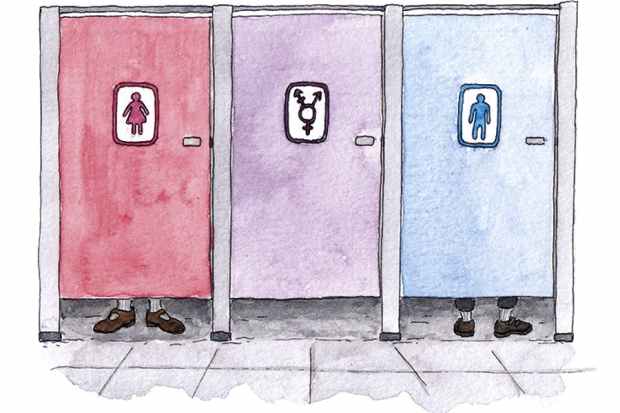Five years ago, in June 2016, Norway allowed anyone to change their legal gender. Legislative Decree 71 was everything that the gender identity brigade would like to introduce in the UK: no diagnosis, no medical reports, pure self-identification. The age limit was set at six years old, providing the child has at least one parent’s consent.
This matters to the UK. Self-identification may be off the table at Westminster but it remains a live issue at Holyrood where Nicola Sturgeon’s government seems determined to force it through. Defending their draft bill on reform to the Gender Recognition Act, the Scottish government explained that ‘This proposal is in line with the approach of a number of other countries, including the Republic of Ireland, Norway, Malta, Denmark and Belgium. Where that has been done, the impact has been positive for the trans community and without a detrimental impact on others.’
Whether they had actually read the Norwegian law that allows primary school children to change sex is unclear, but no detriment is a bold claim for anyone to make.
This week I spoke to a university teacher from Norway who would beg to differ. She asked me to call her Vanessa to protect her relationship with her students. She explained that, ‘the way gender critical women are framed as witches and Terfs could easily damage the relationship I have with them.’
Vanessa took a different view to the Scottish government about the impact of self-identification on Norwegian society. ‘Soon after the law went through, a woman was reported to the police for having asked a male to leave the women’s changing room in a gym.’ That case dragged on for over two years. The woman was eventually cleared of harassment at appeal, but only because the tribunal decided that her comments were not directed at the transwoman — who retained male genitalia — but the arrangements made by the gym.
Since 2016, transwomen with male genitalia can use women’s changing rooms in Norway simply by declaring themselves to be women. Vanessa told me that, ‘all services for women are now open to male-bodied people.’
More recent Norwegian legislation has made the situation worse. The woman at the gym faced civil action under anti-discrimination legislation. Now, Norwegian women who speak their mind when they defend their spaces risk criminal action being taken against them.
Late last year, Norway outlawed hate speech against transgender people. While trans people should all be protected from genuine hate, Vanessa explained that misogyny was still absent from the law, creating a strange imbalance where those choose to be a woman are protected while those who are born women are not. She told me:
I think they decided to leave out sex because they could not possibly handle it all. The wording in the law is gender identity and gender expression. I think gender expression should be protected, but gender identity means that I cannot tell a man to leave a woman’s changing room. Nobody knows what gender identity is but it is now part of Norwegian law. They say it is to protect transgender people, so everyone has to applaud it.
The maximum penalty is three years imprisonment. While noises have been made about ‘high bars for prosecution’, Norwegian women fear being made test cases. But, as Vanessa explained, the inconsistency stings, ‘rape is not a hate crime but pronouns are a hate crime.’
She had strong advice for the Scottish government — who seem as hell-bent on beefing up hate crime legislation as they are on liberalising gender recognition.
Consider carefully what you want to achieve, and listen carefully to everyone, especially women. Do not let one activist group that represent a tiny minority have the final word regarding a law that impacts everyone. Most importantly, consider whether your new laws would conflict with the Convention on the Elimination of All Forms of Discrimination against Women. They are sex-based rights, not gender-based rights.
Norwegian law was changed with little public awareness. Vanessa said most Norwegians knew ‘little to nothing’ about the changes.
There was never an open public discussion about the possible downsides and upsides to the law. In that way, the many issues the law raises were never really thought through. Women’s organisations were never heard. I later learned that this was due to active silencing strategies by the FRI [a leading Norwegian LGBT group].
The law has been a lever to change society and language everywhere in the public sector. In the school curriculum, children learn from kindergarten that it is totally normal that girls have a penis and boys have a clitoris. There is no word in Norwegian for gender so children think that they can change sex.
So many academics buy into this. How can they cope with the cognitive dissonance?
As in the UK, people who voice concerns are being harassed and targeted — ‘witched’, as Vanessa puts it — so even those who do see what is happening cannot speak freely. The impact on women is profound.
She told me that between 2015 and 2017, the number of women reported for rape increased by over 300 per cent. But, since it is impossible to disentangle transwomen from women in the data, Norwegian women now face the indignity of being blamed for the crimes of those born men.
Even International Women’s Day is no longer theirs. Vanessa explained that the banners for the annual parades were determined at meetings. ‘It used to be every woman who signed for the meeting had a vote. Now you have to declare that you are not a man. The self-ID law has made Simone de Beauvoir’s words come true. Norwegian women are the second sex.’
Norway sleepwalked into this mess. If Scotland is citing Norway as good practice, then they must listen to women like Vanessa who are living with the consequences. <//>
Got something to add? Join the discussion and comment below.
Get 10 issues for just $10
Subscribe to The Spectator Australia today for the next 10 magazine issues, plus full online access, for just $10.




















Comments
Don't miss out
Join the conversation with other Spectator Australia readers. Subscribe to leave a comment.
SUBSCRIBEAlready a subscriber? Log in